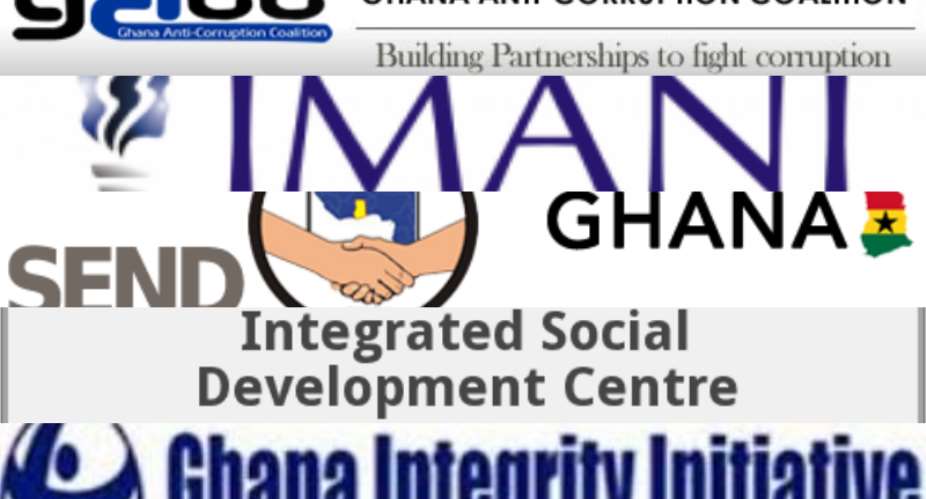As the debate for the compilation of a New Voter's Register rages on, some civil society groups are kicking against the EC's proposal.
The Civil Society Organisations (CSOs) comprises some 18 groupings facing the EC fair and square.
They have taken an entrenched stand and would never buy the EC's decision to compile a new voter's register ahead of the 2020 presidential and parliamentary elections in December.
The CSOs are; Ghana Anti-Corruption Coalition (GACC), IMANI Africa, SEND Ghana, Africa Centre for International Law and Accountability (ACILA), Financial Accountability and Transparency – Africa (FAT-Africa), Media Foundation for West Africa (MFWA), Youth Bridge Foundation, West Africa Civil Society Institute (WACSI), Citizens Movement against Corruption (CMaC) and Human Rights Advocacy Centre (HRAC).
The rest are: Ghana Integrity Initiative (GII), Commonwealth Human Rights Initiative (CHRI), Women in Law and Development in Africa (WiLDAF), Institute for Democratic Governance (IDEG), Parliamentary Network Africa (PNA) and ISODEC.
A press release signed by all the CSOs, noted that it will rather be prudent to; “open up the electoral register for voters to verify their names, update the existing software in ways to make it more efficient, remove names of persons suspected dead or who do not verify, work with the vendors to prime the hardware and where needed replace faulty ones and acquire new hardware to augment the existing stock and work with the existing systems rather than a full end-to-end replacement”.
“We reject the EC's informal, off the grapevine, costing of the alternatives to a full end-to-end replacement. We stand ready to debate the EC in any forum it prefers about its costing”, they added.
The group of CSOs further indicated that if there is a need for collecting fresh data on citizens, the more appropriate, most lawful and financially responsible and justified approach will be to let the National Identification Authority to handle that task.
The full details of the press release are found below
“RECOMMENDATIONS FROM 18 CIVIL SOCIETY ORGANIZATION ON WHAT GHANA SHOULD DO ABOUT THIS NEW REGISTER DISAGREEMENT.
The EC should:
1. Open up the electoral register for voters to verify their names.
2. Update the existing software in ways to make it more efficient.
3. Remove names of persons suspected dead or who do not verify.
4. Work with the vendors to prime the hardware and where needed replace faulty ones.
5. Acquire new hardware to augment the existing stock and work with the existing systems.
This is the more justified approach given time and resource considerations and indeed is the most technically feasible and defensible approach compared to totally replacing the entire system at great cost and running the nation through the trauma of another voter registration exercise.
We reject the EC's informal, off the grapevine, costing of the alternatives to a full end-to-end replacement. We stand ready to debate the EC in any forum it prefers about its costing.
We need to bear in mind that the NIA has struggled to complete its exercise in 3 years, so the EC purporting to do this in less than 1 year suggests a very stressful time for everyone with no guarantees of success, but a definite requirement for huge resource expenditure.
As a nation, if there is a need for collecting fresh data on citizens, the more appropriate, most lawful and financially responsible and justified approach will be to:
1. let the NIA (The legally mandated Authority for collecting national identification data) collect and process the information.
2. The NIA should then send the EC the subset of the information it needs for the purpose of election.
3. The EC can then use that information to update its systems.
This way the nation moves forward and avoids the wasteful duplication of efforts at great expense.”
---CitinewsRoom





 It’s an abuse of power to arrest ECG officials for performing legitimate duties ...
It’s an abuse of power to arrest ECG officials for performing legitimate duties ...
 Unreasonable Actions of GTEC to Collapse Private Universities, Colleges, Institu...
Unreasonable Actions of GTEC to Collapse Private Universities, Colleges, Institu...
 Corruption makes a lot of people rich, happy; NDC, NPP cannot help us – Okyeame ...
Corruption makes a lot of people rich, happy; NDC, NPP cannot help us – Okyeame ...
 GOIL increases fuel prices again, diesel sells GHC14.80, GHC14.99 per litre of p...
GOIL increases fuel prices again, diesel sells GHC14.80, GHC14.99 per litre of p...
 Bawumia will use Ghana’s gold to stabilize the Cedi if voted as President — Ahia...
Bawumia will use Ghana’s gold to stabilize the Cedi if voted as President — Ahia...
 Arrival of state-of-the-art bullet trains signify Ghana’s journey towards enhanc...
Arrival of state-of-the-art bullet trains signify Ghana’s journey towards enhanc...
 Idea behind Performance Tracker is great but shouldn't be limited to election ye...
Idea behind Performance Tracker is great but shouldn't be limited to election ye...
 Election 2024: Bawumia losing 21.8% of NPP’s 2020 Akan votes — Global InfoAnalyt...
Election 2024: Bawumia losing 21.8% of NPP’s 2020 Akan votes — Global InfoAnalyt...
 People are celebrating their 80th birthday and Ghana owes GHS650 billion; who is...
People are celebrating their 80th birthday and Ghana owes GHS650 billion; who is...
 Court issues arrest warrant for Chinese Iron woman, one other over cantonments l...
Court issues arrest warrant for Chinese Iron woman, one other over cantonments l...
